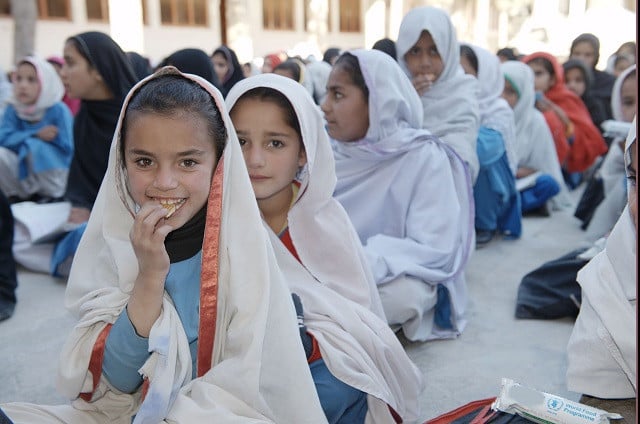The many benefits of a school meals programme
Hunger and malnutrition stifle physical and academic growth among children

Food insecurity is rapidly becoming a global challenge where access to affordable, nutritious food is beyond the reach of many. This is no longer just an issue in lower income countries. Food insecurity, hunger and malnutrition are spreading to middle income and developed countries. We know that children are the most vulnerable to the impacts of food insecurity. We also know that the future of any country depends on its youth.
Hunger and malnutrition stifle physical and academic growth among children. In Pakistan, it is well recognised that the problem of stunting among children is one that needs sustained support and intervention. That 40 per cent of children under 5 years old are stunted (low height for their age) and 17.7 per cent suffer from wasting (low weight for their height) in Pakistan is a travesty given the national food productive capacity. While significant investments are being made by successive governments to tackle this problem, more needs to be done – and quickly – in order to protect the future of the country.

A further challenge that the country faces is the fact that Pakistan has the world’s second highest number of out-of-school children. It is estimated that 44 per cent (22.8 million) of children aged 5-16 do not attend school. In the younger 5-9 age group, 5 million children are not enrolled in schools. The number more than doubles to over 11 million among adolescents aged 10-14. When broken down by gender, nearly 10.7 million boys and 8.6 million girls are enrolled in primary school, although the numbers drop significantly to 3.6 million boys and 2.8 million girls entering secondary school. These statistics are illustrative of the multidimensional impact of poverty. However, there is a solution that has been proven around the world that can address these interconnected issues.
School Meals Programmes address multiple impacts: These programmes are globally recognised as the most effective tool that can support the nutritional health and wellbeing of children as well as contribute to academic performance. In many countries they are an established component of national social protection scheme that support the most vulnerable families. Nearly half the world’s school children in low and middle-income countries, some 310 million, will sit down to eat a school meal. India now feeds more than 100 million children; Brazil 48 million; China 44 million; and South Africa and Nigeria each more than 9 million. These meals are provided not once, but every day of the school year, and in all these countries half of the children fed are girls. In Pakistan, such a programme could help get the 22.6 million Pakistani children, who are currently out of school, back to learning and healthy growth and development.
WFP is a global leader in helping to design and implement School Meals Programmes. We know that School Meals Programmes not only combat hunger and help provide basic nutrition to children, but they also increase the food security of their families through take-home rations. Provision of school meals increases enrollment and importantly prolongs girls’ education. Helping girls stay in school, especially into adolescence, is a powerfully effective way of preventing early marriage and of delaying first pregnancy – two outcomes that otherwise can trap women in poverty and chronic ill health, and consequently further widen inequalities. The knock-on effects of this are extremely positive for other social development indicators as well as for the economy as a whole. Studies have shown a return to the national economy of $9 for every $1 spent on school feeding.
Partnerships are crucial to enable a School Meals Programme fit for purpose: In 2021, the Government of Pakistan signed up to the Global Coalition on School Meals, committing to ensure that every child has access to healthy and nutritious food by 2030. WFP’s commitment is to support the government and leverage our global experience and knowledge to help build a country-wide programme. Currently, WFP is working with the Government of Balochistan and the Government of Khyber-Pakhtunkhwa to design an integrated School Meals Programme to address the issues of child malnutrition and to improve overall education outcomes including the access for girls to education at the primary and secondary levels in low-performing districts of both provinces. These initiatives are examples pointing the way towards a national programme.
National Consultation on School Meals will bring together stakeholders: A National Consultation on School Meals held this week, led by the Ministry of Planning, Development and Special Initiatives, the Ministry of Poverty Alleviation and Social Safety and jointly hosted by WFP, has opened up a pathway for the development of a supportive policy and financial framework. This will enable other provincial governments to customise the School Meals Programme for the context of each province. Partnerships in this endeavour are key – especially if we are to counter the ever-growing number of global issues that are stretching household incomes and reducing access to healthy diets. While we cannot control external factors, we can work within Pakistan to build the networks across Government, together with civil society and the private sector, that can provide a healthier and more productive future for Pakistan’s children. Setting up a national School Meals Programme will provide for present needs and ensure a healthier population for the future. A national commitment to a supportive policy and financial framework to support a School Meals Programme will be a great step forward to enable Pakistan to realise its true potential.
The writer is the Country Director of the World Food Programme in Pakistan
Published in The Express Tribune, May 16th, 2022.
Like Opinion & Editorial on Facebook, follow @ETOpEd on Twitter to receive all updates on all our daily pieces.















COMMENTS
Comments are moderated and generally will be posted if they are on-topic and not abusive.
For more information, please see our Comments FAQ